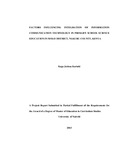| dc.description.abstract | Acquiring basic knowledge and skills on the use of information and communication technologies has become a necessity. Schools incorporate the use of ICT in lessons in order to enable them enhances the quality of teaching and learning. There are uncertainties about this relatively new teaching strategy concerning its effectiveness and factors that surround its integration. The purpose of this study therefore was to investigate factors that influence integration of ICT in primary school science education in Molo district. The study adopted a descriptive survey approach as the research design. The opinions of all the 85 science teachers in the 44 public schools were collected through a survey questionnaire and an observation checklist. The target population was all science teachers of primary schools in Molo district. All science teachers in public primary schools were selected to participate in the study. The data collection instruments were piloted in the neighbouring Kuresoi district, in order to determine their validity and reliability. Data were coded and analyzed using both qualitative and quantitative techniques and were presented in form of tables, graphs and pie charts. The findings revealed that that availability of in-service education and training opportunities for teachers, the attitudes of the teachers, the level of ICT competency among teachers and the availability of ICT resources affected integration of ICT in primary schools science educationIt was also established that there was a general lack ICT resources in the schools, and those found were located in the administrative office thus not being accessible for integration of ICT.
The researcher recommended increased in-service education and training opportunities for teachers in the integration of ICT, attendance of in-service education and training related to ICT integration be made a prerequisite for promotion so that the science teachers take it seriously, and adequate ICT resources be provided in all schools. In addition, the researcher also recommended that support services such as internet connectivity, electric power, and security needed to be assured for all schools. The researcher concluded that availability of in-service education and training opportunities for teachers affect integration of ICT in primary schools science education. It was also concluded that the attitudes of the teachers affected integration of ICT in primary schools science education. Also, it was concluded that the level of ICT competency among teachers affected integration of ICT in primary schools science education. Majority of them did not have the basic knowledge and skills to enable to effectively conduct integration of ICT in the classroom. In addition, it was concluded that the availability of ICT resources affected integration of ICT in primary schools science education. Majority of public primary schools lacked ICT resources. The researcher suggested similar study could be conducted on other subjects besides science education in primary schools to establish factors that influence integration of ICT in the teaching and learning process of the subject | en |

